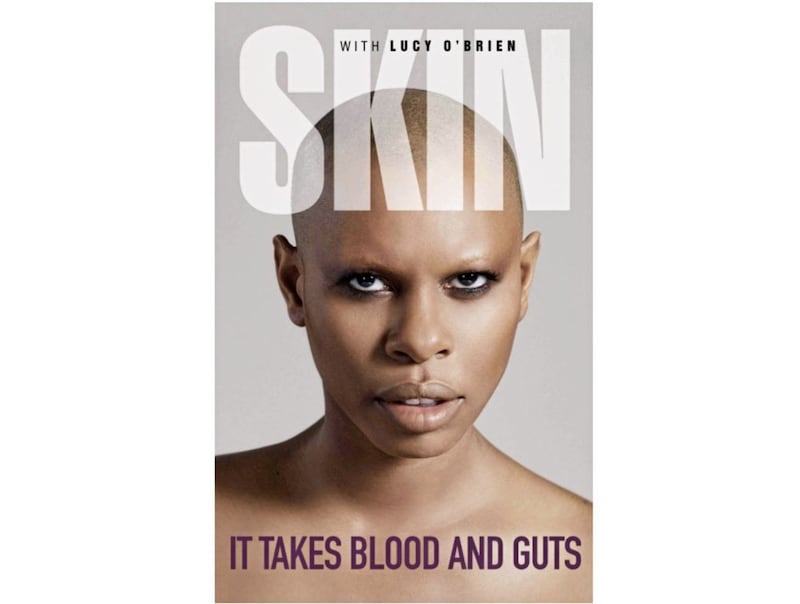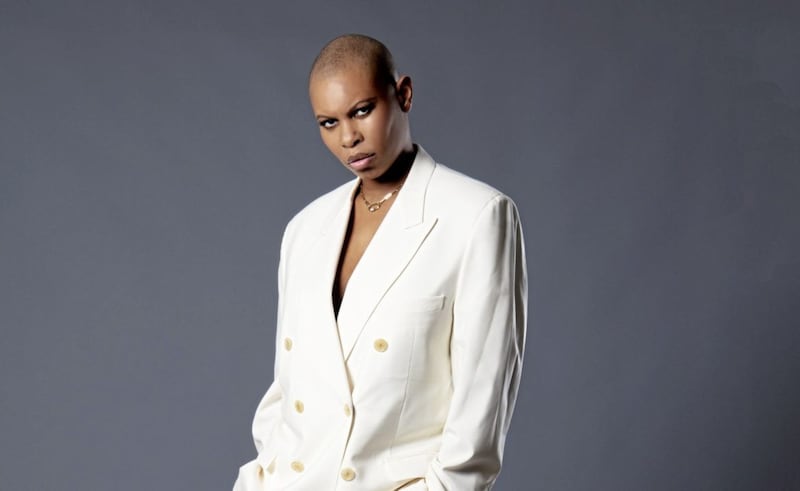“I’ve had to learn to blow my own trumpet because – as a black female singer – no-one was going do it for me,” explains Skin down the phone from her Ibiza home.
As the frontwoman of Skunk Anansie, Deborah Dyer – AKA Skin – offered an alternative voice to the machismo of Britrockers such as Oasis and Blur during the 90s.
“If I am modest I disappear,” she says. “I don’t like to sit here and say, ‘I was the first black woman to headline Glastonbury’. That’s not my personality.
“But one of the ways that racism works is that it erases what black people do. It erases our successes.”
Black, British and queer, Skin, now 53, was a rarity in the fairly homogeneous landscape of 90s pop and rock.
Her autobiography, fittingly titled It Takes Blood And Guts, charts a difficult but warm childhood in Brixton, south London, through to her hard-touring years in Skunk Anansie – a band that defied expectation, not only because of its diverse line-up of musicians.
The book also touches on Skin’s activist work, campaigning against apartheid and for LGBT rights, and glitzier turns like her stint as a judge on the Italian version of the X Factor.
Add to that her late reinvention as a globe-trotting DJ and close relationship with the fashion world, including the late Alexander McQueen, and you are guaranteed some good stories.

“I have three brothers so I was raised in a house of boys,” she recalls. “There was a lot of man energy around.
"In Jamaican families, in Jamaican culture, if someone is hungry you feed them. If someone comes to your house then you put down an extra plate. That’s cultural.
“And my mum, a nurse, was like that. Lots of Jamaican were like that. They showed their love by filling your belly.”
Skin’s memories of Brixton in the 70s and 80s are mixed, she says. The riots of 1981 and 1985 left an impact – spurring her on to activism.
“The negative things that were happening to people were literally happening outside my front door. Things that you read about, they were happening to me and to us and our generation.
“I was raised with the concern of, ‘This just isn’t right. Why is that fair? That person shouldn’t die in that way. That person shouldn’t be treated that way’. You just see a lot of things growing up that you just don’t think are very fair, so you want to change things.”

Today, the gentrification of the area is something that concerns her.
“The wonderful thing about Brixton is Brixton Market. But it has been under attack for years now. Eventually we are going to see it disappear because the new people moving in don’t really get it.
"They don’t really get the black food. They don’t really get that it is supposed to be a bit edgy and bit messy, with people shouting and selling goods. They want their market to be quiet and beautiful and peaceful.”
Much of Skin’s family still lives in Brixton – including her mother and one of her brothers – but some have moved on because of various factors including rising rents.
Skunk Anansie’s peak originally stretched from 1995’s Paranoid & Sunburnt to 1999’s Post Orgasmic Chill, before the band split for a decade.
Throughout, Skin’s fame – she was instantly recognisable for her shaved head – was both a blessing and a curse.
“Entourages can be a very dangerous thing to an artist because they shield you from things you need to know – and things you don’t need to know,” she says, with a knowing laugh.
“Sometimes they get it really, really wrong – which is why I don’t have one!”
Much of the book explores Skin’s struggle to maintain connection with her family, friends and partners as she tours the world. Has she got the balance right now?
“Yeah, totally,” she says without hesitation. "WhatsApp groups change everything.”
The first act of Skunk Anansie’s career peaked with a slot on Glastonbury’s Pyramid Stage in 1999, alongside fellow headliners REM and Manic Street Preachers.
“Headlining Glastonbury for us was a double-edged sword because, if you imagine, we were one of the biggest bands in the UK at the time, and also in Europe. Our second album was triple platinum.
“We absolutely deserved to headline Glastonbury in terms of statistics, in terms of record sales, in terms of the size of the band. And yet, we had so many journalists that were anti-Skunk Anansie headlining Glastonbury.”
Their detractors dressed up their criticism, she says.
“But what they really meant was there is a black female lead singer and she shouldn’t be singing rock music anyway. That was what was really behind it.
“You can say that now, but if we had said that at the time we would have been told we had a chip on our shoulder.”
Skin is quick to point out a catalogue of black artists or predominantly black groups who could have headlined over the years.
“Goldie could have done it at one point, Dizzee Rascal could have done it at one point, even Eternal could have done it at one point!
“It’s not that we aren’t there. It’s that we don’t get the dibs and we don’t get seen as someone who can fill a field.”
Aided by journalist and friend Lucy O’Brien, Skin began her book before the pandemic, but it was finished during the first months of lockdown.
“I spent the first four months of proper serious lockdown in New York with my wifey and we literally didn’t go anywhere.
“New York was really serious about it. They had a curfew which started halfway through because of all of the protesting and demonstrations that the government tried to clamp down on.”
Skin finally made it to London before arriving in Ibiza about a fortnight before we speak.
For now, at least, hers is a happy ending: in September she announced her engagement to her partner, performer and events organiser Rayne Baron.
:: It Takes Blood And Guts by Skin and Lucy O’Brien is available now








